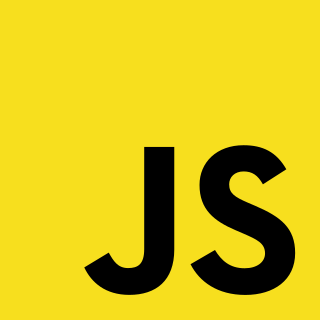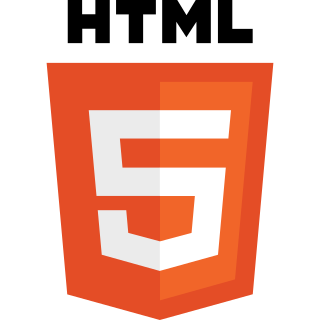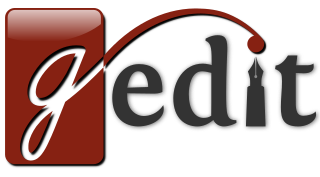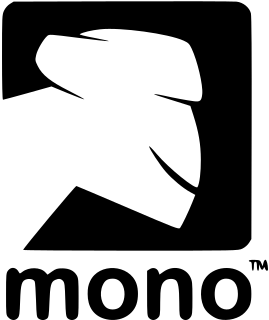This article needs additional citations for verification .(September 2014) (Learn how and when to remove this template message) |
 | |
| Filename extension | .page |
|---|---|
| Developed by | Shaun McCance |
| Type of format | markup language |
| Extended from | XML |
| Standard | projectmallard.org Mallard 1.0 |
Mallard is a markup language for the creation of help pages and user documentation for applications (technical documentation). Mallard 1.0 was released on 23 July 2013. [1]

In computer text processing, a markup language is a system for annotating a document in a way that is syntactically distinguishable from the text. The idea and terminology evolved from the "marking up" of paper manuscripts, i.e., the revision instructions by editors, traditionally written with a red or blue pencil on authors' manuscripts. In digital media this "blue pencil instruction text" was replaced by tags, which indicate what the parts of the document are, rather than details of how they might be shown on some display. This lets authors avoid formatting every instance of the same kind of thing redundantly. It also avoids the specification of fonts and dimensions, which may not apply to many users.
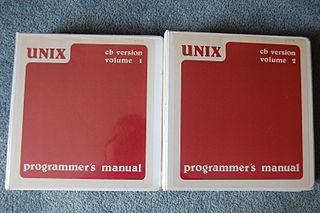
Documentation is a set of documents provided on paper, or online, or on digital or analog media, such as audio tape or CDs. Examples are user guides, white papers, on-line help, quick-reference guides. It is becoming less common to see paper (hard-copy) documentation. Documentation is distributed via websites, software products, and other on-line applications.
Mallard is an XML language. Similar to DocBook, it defines the logical structure of a document. The documents are then displayed in a help browser, which creates links between the documents. Concepts such as guides and topics provide means for reaching help pages in different ways.
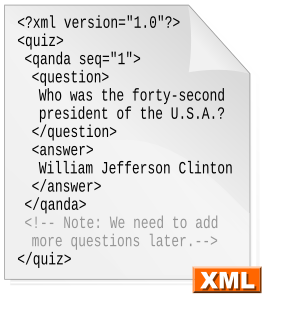
Extensible Markup Language (XML) is a markup language that defines a set of rules for encoding documents in a format that is both human-readable and machine-readable. The W3C's XML 1.0 Specification and several other related specifications—all of them free open standards—define XML.
DocBook is a semantic markup language for technical documentation. It was originally intended for writing technical documents related to computer hardware and software but it can be used for any other sort of documentation.
At the moment, GNOME applications such as Web, Eye of GNOME, Evince and others use Mallard for documentation purposes. Mallard is the preferred system for the Gnome Documentation. [2]

GNOME is a free and open-source desktop environment for Unix-like operating systems. GNOME was originally an acronym for GNU Network Object Model Environment, but the acronym was dropped because it no longer reflected the vision of the GNOME project.

Eye of GNOME is the official image viewer for the GNOME desktop environment, where it is also known as Image Viewer. Eye of GNOME provides basic effects for improved viewing, such as zooming, full-screen, rotation, and transparent image background control.
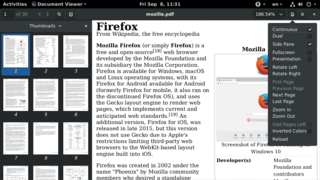
Evince is a document viewer for PDF, PostScript, DjVu, TIFF, XPS and DVI formats. It was designed for the GNOME desktop environment.
Mallard pages can be viewed in Yelp, a GNOME help browser. [3] Further output formats are planned that can be generated via the command line using the tools that are provided via Gitorious:

Gitorious was a shared web hosting service for collaborative free and open-source software development projects that use the Git revision control system. The name also refers to the free and open-source server software that the Web site is developed and hosted on. According to the Git User's Survey in 2011, Gitorious was the second most popular hosting service for Git, with 11.7% of respondents indicating they use it, behind 87.5% using GitHub. On 3 March 2015, Gitorious was acquired by GitLab, who announced service through gitorious.org would be discontinued on 1 June 2015 and encouraged Gitorious users to make use of its import tools to migrate projects to GitLab.
